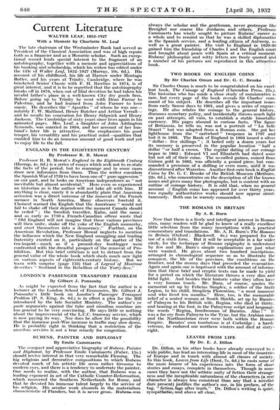Professor R. B. Mowers England in the Eighteenth Century (Hamm,.
4s. (id.) is a series of essays which seek not to re-state the facts of the period, but to rearrange and in some cases draw new inferences from them. Thus the writer considers the Spanish War of 1739 to have been one of" pure aggression" on our part, and he looks on-American independence as " not inevitable but alinost accidental." Here even so experienced an historian as is the author will not take all. with him. If anything is clear, surely it is abundantly plain that American secession was a direct outcome of the removal of the French menace in North America. Many observers 'foretold it. Choiseul warned the English that the Americans " would not fail to shake off their dependence the moment Canada should be ceded " • the Swedish traveller, Kahn, said the same ; and as early as 1710 a French-Canadian officer wrote that " Old England will not imagine that these various provinces will then unite, shake off the yoke of the English monarchy, and erect themselves into a democracy." Further, on the American Revolution, Professor Mowat neglects to mention the influence which the New: England smugglirignnd-trading fraternity exerted on it, particularly on the matter of the tea-import—much as if a. present-day bootlegger were confronted with the dreadful prospect of the removal .of Pro- hibition. But this brief criticism is not to detract from the general value of the whole book which' sheds much new :light on various aspects of eighteenth-century history. - But we learn with surprise (page 153) that A Legend of Montrose describes •• Scotland in the Rebellion of the 'Forty-five."






































 Previous page
Previous page